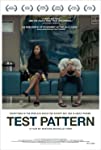Eye For Film >> Movies >> Test Pattern (2019) Film Review
Test Pattern
Reviewed by: Jennie Kermode

There are many films out there about rape. Test Pattern, however, is something new. Quiet, matter-of-fact and focused almost entirely on the victim's perspective, it charts the aftermath of an assault and the differing responses which threaten to tear apart what previously seemed like a perfect relationship. Fissures spread out from the violence at its centre, doing most damage where the ground was already weak.
Because no secret has been made of the film's subject matter, a shadow hangs over the action from the start. We see Renesha (Brittany S Hall) on a night out with her friends, approached by a stranger (Will Brill) who asks for her phone number. Your guard might already be up, but this is Evan, who has no ill intent and whom she goes on to fall in love with. Some time later, there's another meeting. She's with a friend, drinking more than she meant to. He's with his friend, celebrating a business achievement. When her friend and his get together, she laughs and has fun talking and dancing with him. She takes a weed gummy; she's enjoying herself. But she has made it clear that she's attached and doesn't want to have sex. We see enough of what follows to know that she's unconscious, that there's no way he could have misinterpreted the situation. The next day, when she wakes up, she walks around like someone in shock. He drives her home. It's Evan and he friend who bring into focus the fact of what has happened to her, and who decide that she needs to take action.
There are two distinct threads to what happens after this. Firstly, the process of visiting one clinic after another in search of a rape kit and somebody qualified to administer it, which turns out to be ridiculously complicated, easily enough to deter anybody uncertain and alone. Secondly, the processing of the experience, which is made more difficult for Renesha by other people's attempts to frame it for her - especially Evan's. A fragment of a past conversation in which he claimed ownership of her appears in fuzzy flashback, an innocent, playful moment which now takes on a new tone. Differences in their experience of the world also become apparent, often manifesting along racial lines. Evan, who is white, thinks they should call the police. He fails to anticipate that Renesha, who is black, might not want that or expect it to help.
Fist time feature director Shatara Michelle Ford weaves these two threads together with a confidence that is reflected in the patience with which she lets the story unfold. Nothing here is rushed. There is no sense of urgency for things to happen, beyond the characters' internal concerns. Ford knows how to wait - a rare skill even in experienced filmmakers - and create space for internal journeys rather than distracting us with mere events.
It is this waiting that really brings pressure to bear, as Evan becomes increasingly anxious for some proper, approved process to take over and Renesha, though she struggles to express it, becomes more and more desperate to get some time alone. The film is likely to divide viewers. Some will see Evan's devotion, his resistance to rape myths and his desire for justice as qualities Renesha should be grateful for. others - especially those who have been in her shoes - will see, first and foremost, his failure to listen, to really centre her experience and needs. Hall's performance is exceptional and sometimes difficult to watch. We can see the weight of what has happened slowly bearing down on her at the same time as she is beginning to grieve the loss of the relationship she thought she had, the closeness which, perhaps, was imaginary for both of them.
Can their relationship survive this? Should it? Where a lesser filmmaker might concentrate on notions of justice or a desire for revenge, Ford explores aspects of what it is that makes rape so damaging, such a violent interruption to the patterns of life. There is an exposé here of disgraceful failings in the way the US deals with rape, but it is the personal journey, and the questions it invites it to ask about our own relationships with others, that really stands out. It is a film that hinges on imposition by another, yet it is a film about being alone.
Reviewed on: 19 Feb 2021
















